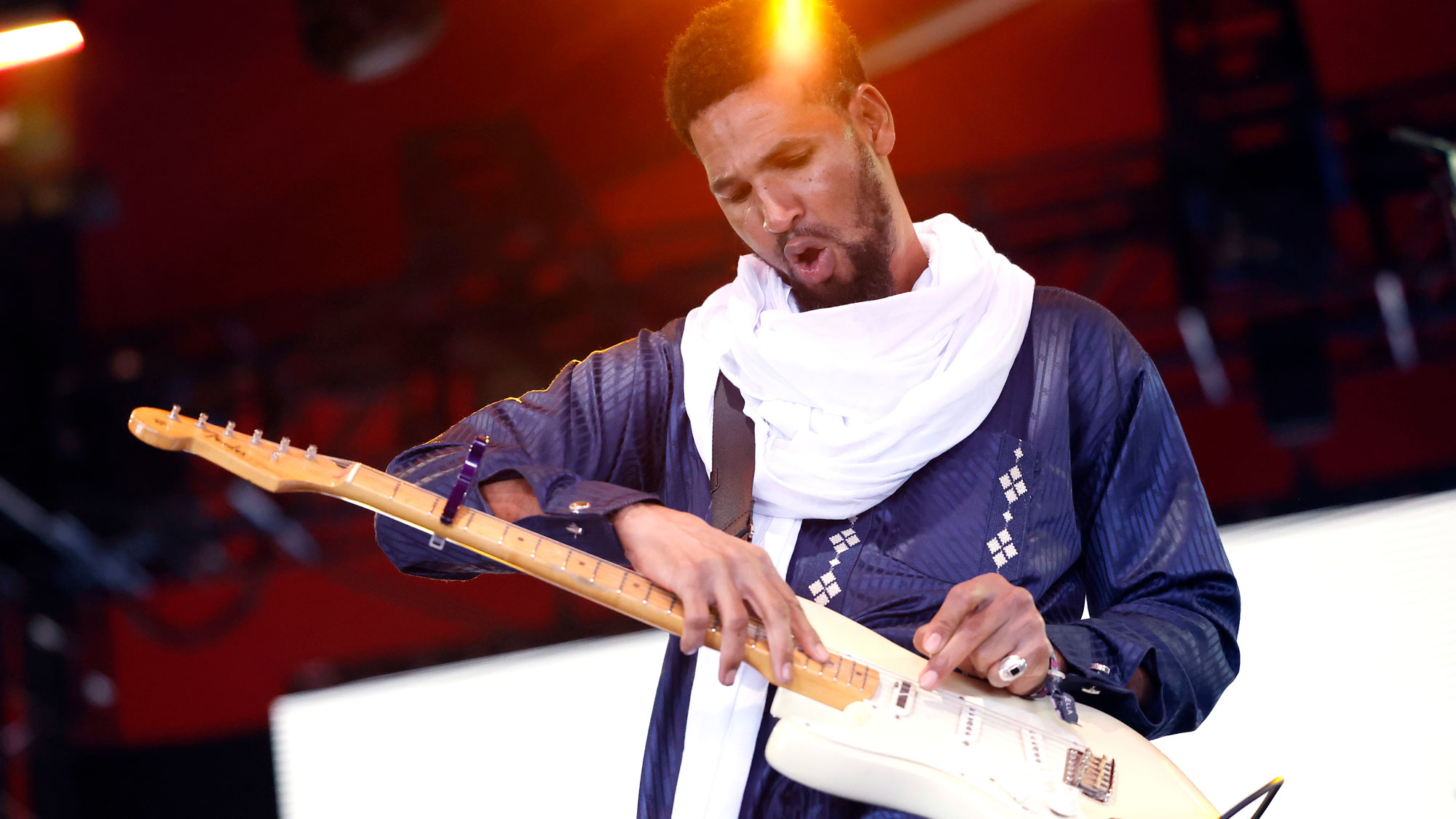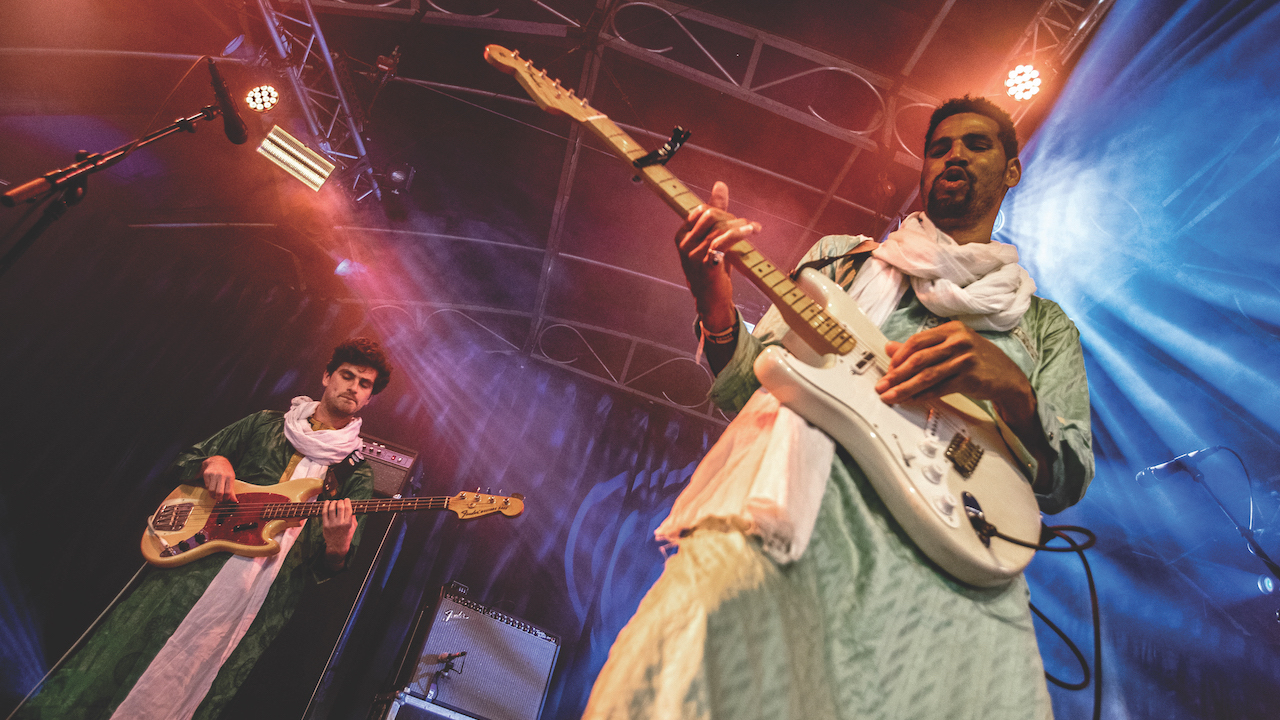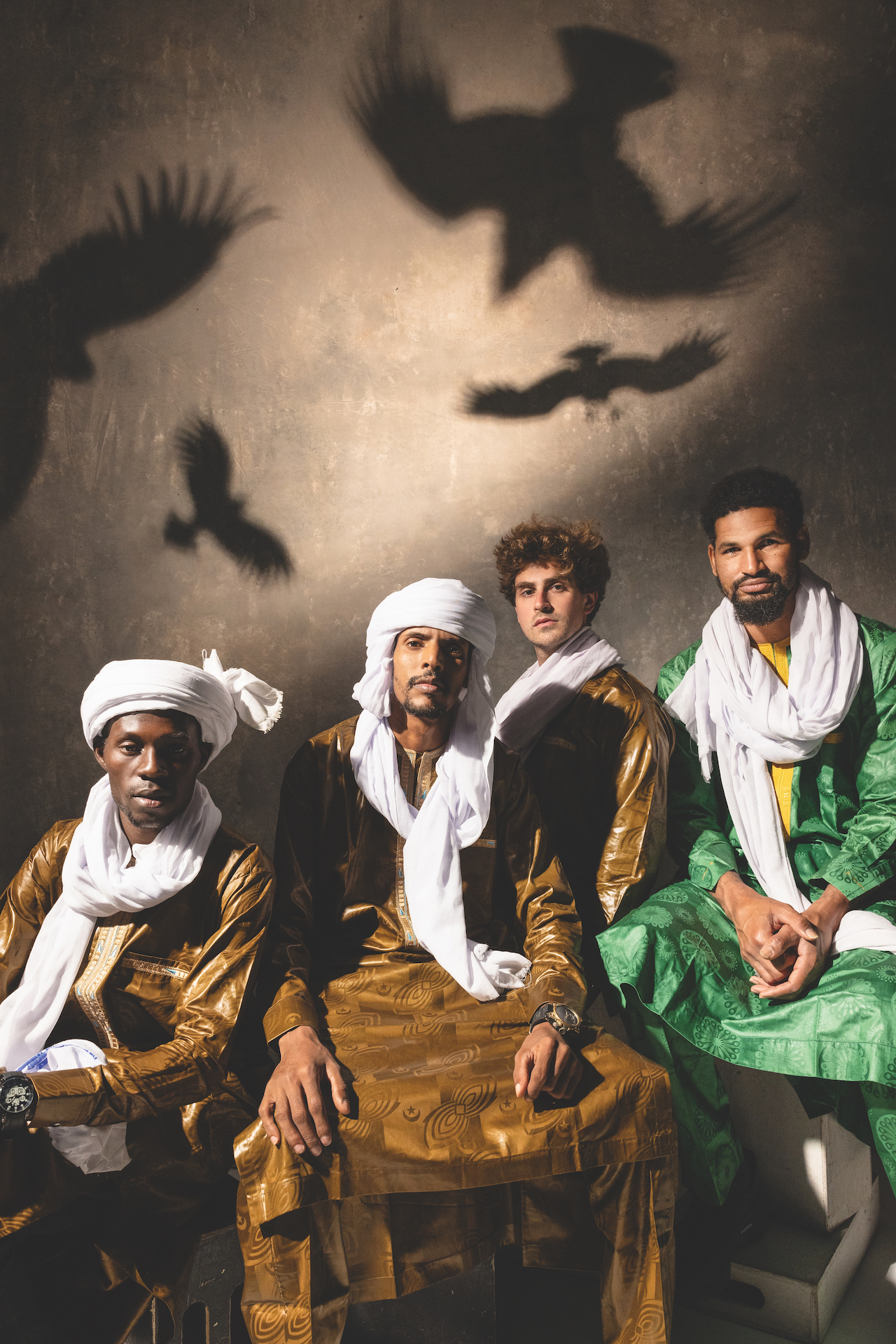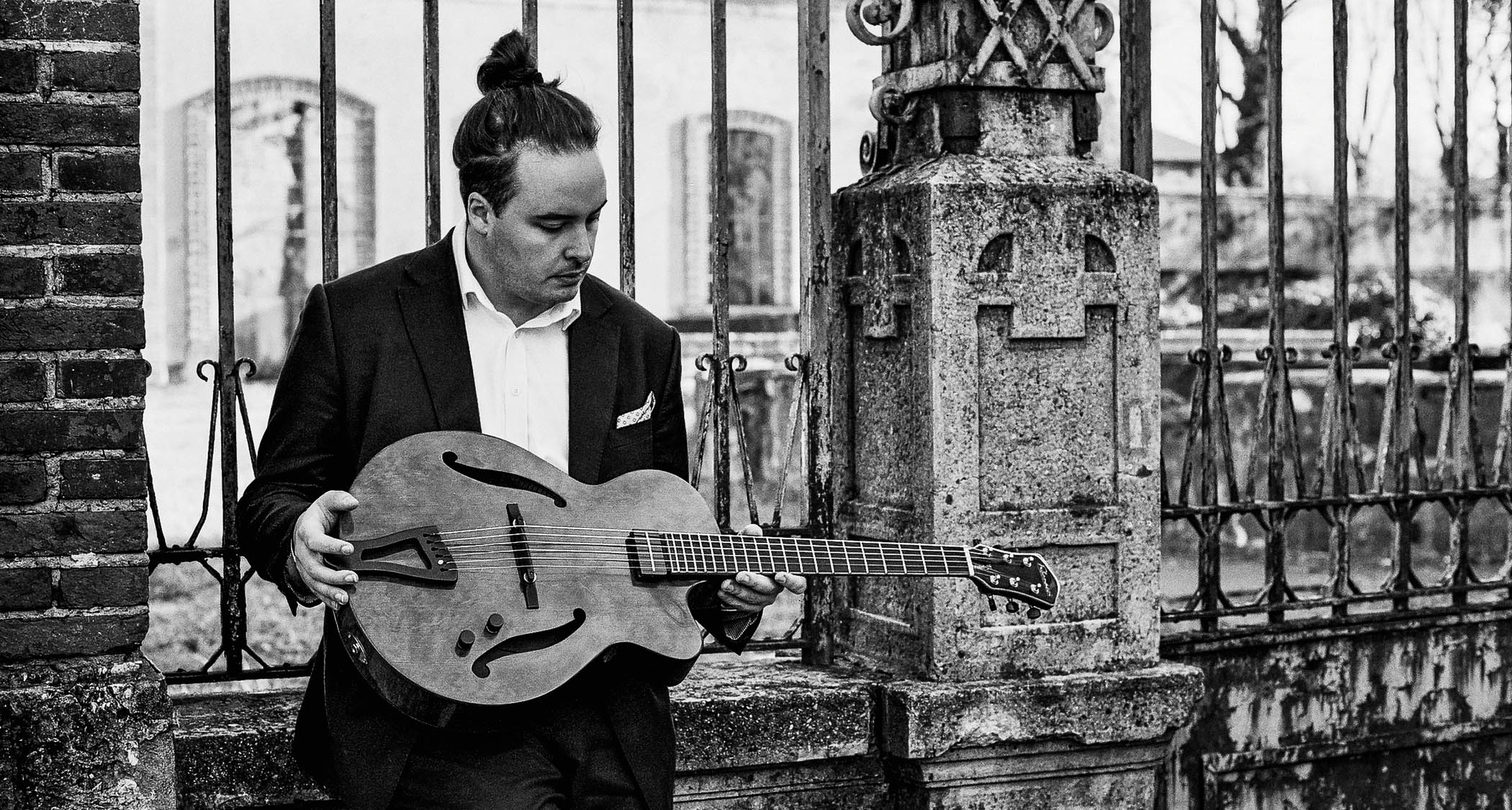“When I was very young I didn’t have access to Western music. In 2016, I was first introduced to Eddie Van Halen and Jimi Hendrix”: Mdou Moctar is one of Africa’s premier guitar heroes – and he’s using his Stratocaster to spark a revolution
As the Niger guitarist releases a bristling new collection of protest songs, he explains how injustice puts the fire in his fingers, what keeps him loyal to the Strat, and why everybody in his hometown wants to play guitar

Back in the ’60s, the template for a protest singer was set as an earnest fingerstyle folkie, regaling a cross-legged audience in a Greenwich Village coffee house. 5,000 miles away, and a half-century later, Mdou Moctar didn’t get the memo (in fact, as the African guitarist tells us today, almost no Western media whatsoever made it to his childhood city of Arlit, Niger).
As such, seventh album, Funeral For Justice, finds him chronicling the travails of his devastated nation with a fiery, feedback-soaked Stratocaster, revving up the musical traditions of his Tuareg ancestry and, critically, making audiences dance like there’s no tomorrow…
Told through a French translator, his backstory takes some beating. Having built his first guitar from stray wood, bicycle brake-cables and tuners fashioned from the keys for opening sardine tins, Moctar shrugged off the disapproval of his Muslim parents (“They thought I would drink alcohol or take drugs”) to perform at local weddings.
But it was 2008’s debut album, Anar, that changed his trajectory, its songs proliferated via Africa’s cellphone music-trading networks, and later included on an influential compilation by Oregon-based record label Sahel Sounds.
Moctar has travelled far since then, commanding audiences across the world and feted in the pages of the transatlantic music press. But on Funeral For Justice, it remains the socio-political backdrop of Niger – where grinding poverty and terrorism are still a day-to-day reality – that drives his music.
Funeral For Justice is a powerful album title. What does it mean to you?
“I started wondering – does justice really exist? Of course, there is a system of justice, with judges and so on. But, for me, real justice doesn’t exist in this world.
All the latest guitar news, interviews, lessons, reviews, deals and more, direct to your inbox!
“When I look around, I see weaker people being manipulated by the system. I see great differences between the privilege of nations, in terms of how you get treated based on your skin colour.
“I see the rich dominating the poor, the powerful getting all the resources and their versions of the story being believed. Whereas the weak and the poor are treated as liars and their rights aren’t respected.
The guitar reflects how the player is feeling. At least, that’s how we play. It’s how I’m feeling inside that makes the guitar speak
“Take the example of a child dying. We lose kids every day in Africa. Many women still have to give birth under trees and drink dirty water. Whereas in Europe or the US, if a child was to die in that way, it would be on the front page.
“And how many kids die in the sea while trying to cross over to Europe for a better life? How many innocent kids whose parents don’t even make $2 a day are being bombarded with bombs that cost millions? All this is what makes me say that there is no justice and that we need to write an album on that topic.”
The album ends with Modern Slaves, a haunting acoustic lament to the status of your countrymen. What inspired that?
“This song reflects the fact that – in theory, on paper – Niger is free, and has been free since the ’60s [when the country achieved independence from French colonial rule]. But that’s not what we’re seeing in real life.
“It feels almost temporary. So that’s what pushed us to record this track. Some people in Niger haven’t even seen electricity, even though below their feet are uranium resources that other countries are mining – all they get is the dangerous uranium dust that remains. We have all the resources we need and still other countries are exploiting those and getting richer, while we’re suffering.
“Another example is the CFA franc, which is printed in France and used locally – yet you can’t use it in Europe. France calls itself our ‘mother’ and says it will take care of us, yet it is extremely difficult to get a visa to visit France, whereas obviously the other way around is not the case. So it feels like a modernised version of slavery.”
What vibe did you want your guitars to have on Funeral For Justice?
“For me, the guitar reflects how the player is feeling. At least, that’s how we play. I’m not someone to sit down at a table with a pen and paper and decide how it’s going to sound. It’s how I’m feeling deep inside that makes the guitar speak.
“If I’m singing about love, for example, you might feel like the guitar is caressing you. And if I’m trying to send out a very serious message that makes me angry, I think you’re going to find out by listening to my fingers.
“My guitar solos depend entirely on how I’m feeling – with Imouhar, in particular, I wanted to really call out to people, so that’s maybe why the solo sounds like it’s reaching out.”

You’re associated with the Stratocaster – why is that such a good model for you?
“I still like the Stratocaster. First of all, I really like the sound it produces and the dimensions fit perfectly with my body – and it doesn’t hurt me. So that’s what I’m looking for in a guitar. As for amps, I have to apologise because I don’t know all the brands – and I don’t remember the names of my pedals, either [see interview with producer Mikey Coltun, below]. I just know what sounds I like.”
Do you think good guitar playing is in the gear or under your fingertips?
[In] Agadez, music is almost like football in Brazil. Everyone wants to play guitar, everyone loves it. It really is a city of music
“Obviously, I do think it helps a player progress if they like the sound they’re producing. But, to me, the most important thing is how hard you work. You have to just keep practising, over and over, and push past your limits to really produce good music, just like in other fields.
“You could be given the best instruments in the world, but if you don’t know how to play well, it’s not going to sound good. However, if you’ve worked a lot and then you start to get some good instruments, it’ll really be something. But it comes down to work.”
You’ve spoken about hearing the desert blues pioneer Abdallah Oumbadougou perform, which led you to build your first guitar shortly afterwards. Were you inspired by any Western guitarists?
“Honestly, not really, because when I was very young I didn’t have access to Western music. I just didn’t have the technology to access it. Locally, the only artists we knew were very famous singers like Michael Jackson, Celine Dion, Tupac Shakur or some other rappers – but as you can tell, that was very different to what we were playing, so I can’t say it had a big impact on me.
“But as soon as I started touring, I started going to other concerts and listening to more artists. In 2016, I was first introduced to Eddie Van Halen and Jimi Hendrix.”
How important is music in Niger? Why do people need it so much?
“I can talk about my town of Agadez, at least, where music is almost like football in Brazil. Everyone wants to play guitar, everyone loves it. It really is a city of music.
“And it helps young people who don’t have a job. If you know how to play guitar, you can perform at weddings, and some people get by that way – you can make $200 a week, sometimes even $2,000, if you’re lucky. Other weeks there’ll be no work, but maybe your friend will have found something else.”
You recorded most of Funeral For Justice over five days in an unfurnished house in upstate New York, with US bassist/producer Mikey Coltun. What are your favourite memories from the sessions?
“For me, my favourite memory was actually recording the song Funeral For Justice. It made me feel good, and it was the right time to do it, because it was a period in which I had lost many friends – so that will stay with me forever.”
Do you think you play guitar differently in the studio, relative to on stage?
“It’s totally different for me. I much prefer playing at concerts, rather than being locked up in a studio. Of course, I respect the work that sound technicians do, but I’m someone who loves the kind of freedom that I can’t get in the studio.
“Honestly, I have a hard time following the exact time restrictions. Y’know, sometimes you have to follow the ‘tick, tick, tick’ of a click track, and I don’t feel comfortable with those kinds of tools.
“That’s why I think that sometimes our studio recordings are almost like a live performance. Even at concerts, we don’t really write down exactly what we’re going to do – because each concert is different. We always adapt to what we’re feeling in the moment, and also reflect the energy of the audience.”

Musically, the Funeral For Justice material seems to have more bite than your past albums. Why do you think that was?
“The music I make depends on what I’m feeling and what nature is giving me. At the moment, I feel like the world is a bit lost and that’s why you might feel more anger in this album. But, for me, it’s really important that the album sounds upbeat, too, because if people are enjoying the music through dancing, they might become curious about what I’m saying.”
Do you think music can actually make a difference – that people won’t just play Funeral For Justice in the background but actually reflect on what you’re saying?
“I can’t say for sure, but I feel that it will change something. I think today, many people have understood that they’re being manipulated, especially in the African continent, where the youth have started to revolt against the injustices they face. So maybe, in the future, it will change something. At least, that’s what I believe.”
Mikey Coltun on producing the Funeral For Justice sessions
What can you tell us about the guitars Mdou used on Funeral For Justice?
“Mdou used his American Professional series left-handed white Strat. We got this in 2018. It’s a newer American-made Strat with Lollar pickups and a Sustainiac pickup at the neck. He uses D’Addario NYXL 10s and doesn’t like the sound of new strings. I think the ones that were on the guitar for Funeral For Justice were two years old.”
What effects did Mdou use for the sessions?
“In terms of pedals, we had a TC Electronic PolyTune 2 and an EarthQuaker Devices Acapulco Gold. I had the latter modded for an internal trim pot to not blow amps – Mdou tends to just turn the knobs on pedals all the way up so I needed to find a boost, but not too much, since the EarthQuaker pedal has a lot of headroom.
“There was the Union Tube & Transistor Shiny pedal, our signature [Champion Leccy] Rockstar Fuzz V1 – this pedal is almost always on as his preamp for slight crunch – and the Boss PH-3 Phaser and a Boss DD-7 for slapback delay.
“I took a few different DI signals from Mdou. There was a clean guitar without pedals, DI with pedals, and a DI with an amp simulator, which was just used for headphone monitoring. With the clean DI, I did use a few different Analog Man pedals such as the King Of Tone and Astro Tone Fuzz through an old Vibro Champ – that’s what you’re hearing on Takoba.”
What details can you share about Mdou’s amp setup?
“[Mixing engineer] Seth Manchester and I reamped Mdou’s guitar through a Soldano SLO-100 and a Traynor 4x12 cab. This amp is made for Mdou. Since Mdou doesn’t play with a lot of dynamics and it’s pretty much just hard fingerpicking on the bridge pickup, there tends to be a lot of bright sizzly highs and not enough clarity. The SLO just scoops all the unwanted high frequencies out. For mics, we used a Neumann U 77 and Coles 4038, like, 3ft to 5ft away going into API preamps.
“After reamping, I throw a Space Echo [RE-]201 on the left and right sides for a bigger sound. There were no Roland JC-120s on this record – however, on some songs like Oh France, I used a Roland Chorus Echo [RE-]501 for that chorus sound.
“The chorus on the 501 is a bit different than the JC-120 – it’s more similar to the Roland battery-powered Cube chorus, which is widely used throughout all of West Africa and one of Mdou’s favourite amps.”
- Funeral For Justice is out now on Matador.
Henry Yates is a freelance journalist who has written about music for titles including The Guardian, Telegraph, NME, Classic Rock, Guitarist, Total Guitar and Metal Hammer. He is the author of Walter Trout's official biography, Rescued From Reality, a talking head on Times Radio and an interviewer who has spoken to Brian May, Jimmy Page, Ozzy Osbourne, Ronnie Wood, Dave Grohl and many more. As a guitarist with three decades' experience, he mostly plays a Fender Telecaster and Gibson Les Paul.




